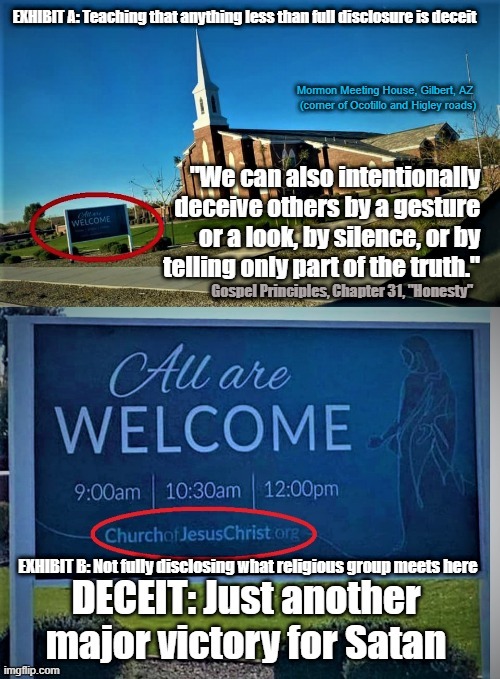“I bear my testimony that Biblical Christians love Latter-day Saints”

A mainstream, Biblical Christian enjoying a discussion with a Latter-day Saint on the streets of Manti, Utah. (photo credit: Mark Shreve)
by Michael “The Ex-Mormon Apologist” Flournoy
Introduction
Mormonism is fueled by faith-promoting stories. No one said this better than Mormon Apostle, Bruce R. McConkie, “We have in the Church an untapped, almost unknown, treasury of inspiring and faith-promoting stories. They are the best of their kind and there are thousands of them.” (“The How and Why of Faith-promoting Stories”, New Era magazine, July 1978). Unfortunately, some of them, as another Mormon Apostle said well, only provide “…a kind of theological Twinkie—spiritually empty calories?” (Jeffrey R. Holland, “A Teacher Come from God”, Spring General Conference 1998). This series exposes the following ten “Twinkies”…
10 Myths That Mormonism Tells About Biblical Christianity
- Biblical Christianity apostatized.
- The Bible has been corrupted.
- Biblical Christians believe in cheap grace.
- Biblical Christians believe Christ prayed to Himself.
- The Biblical Christian God is a monster who sends good people to hell just because they never had a chance to hear the gospel.
- Biblical Christians worship the cross and the Bible.
- Biblical Christians have no priesthood.
- Biblical Christian Pastors and Apologists practice Priestcraft – they’re only in it for the money.
- Biblical Christians hate Mormons.
- Biblical Christianity is divided into 10,000+ sects, all believing in different paths to salvation.
… and replaces them with nourishing truth. Let’s talk about the one that’s bolded, shall we?
The Myth
“Biblical Christians hate Mormons.”
Those in Mormon Studies are often fascinated by the infamous “Mormon Persecution Complex” of which this myth is a byproduct. And it’s not hard to find out where and how this myth came to be; one need look no further than current official and correlated LdS Church manuals. For example please consider Chapter 27 of the official LDS Church curriculum, “Teachings of Presidents of the Church: Joseph Smith” (pp.315–26) entitled, “Beware the Bitter Fruits of Apostasy”:
“From apostates the faithful have received the severest persecutions. Judas was rebuked and immediately betrayed his Lord into the hands of His enemies, because Satan entered into him… Renegade ‘Mormon’ dissenters are running through the world and spreading various foul and libelous reports against us, thinking thereby to gain the friendship of the world, because they know that we are not of the world, and that the world hates us”
Then later in Chapter 32 of the very same manual entitled, “Responding to Persecution with Faith and Courage”, we find these words from founding Prophet, Joseph Smith himself:
“It is thought by some that our enemies would be satisfied with my destruction; but I tell you that as soon as they have shed my blood they will thirst for the blood of every man in whose heart dwells a single spark of the spirit of the fullness of the Gospel. The opposition of these men is moved by the spirit of the adversary of all righteousness. It is not only to destroy me, but every man and woman who dares believe the doctrines that God hath inspired me to teach to this generation.”
And this “indoctrination” (as it’s often called by Mormon Studies Scholars) isn’t limited to adults; it begins in the lessons that are taught in LdS Church Primary classes. Consider, for example, these instructions for teaching Primary children who are 8-11 years old from the Primary 5: Doctrine and Covenants and Church History (1997) manual in “Lesson 21: Joseph Smith Is Tarred and Feathered,”
“Teach the children about Joseph Smith’s reaction to those who persecuted him, as illustrated by the following historical account. Display the pictures at appropriate times.
Soon after the Church was organized, some of the members began to apostatize, or leave the Church. They quit attending Church meetings, opposed the Prophet, and persecuted the Saints. People apostatized for various reasons. For example, one man left the Church because his horse died while he was traveling to join the Saints in Missouri. Another man apostatized after he saw Joseph Smith playing with children. He thought a prophet should be too serious to play with children. One man saw that his name was misspelled on a Church document and thought that meant Joseph Smith was not inspired by God. Other people left the Church because they did not receive the help they expected with their financial problems. Some members left the Church because they could not forgive other members for actions that had offended them. After leaving the Church, these offended people often became the Church’s worst enemies.”
Thus, Richard N. and Joan K. Ostling, were correct when on page 115 of their well-known book, “Mormon America: The Power and the Promise (2007 Edition),” they observed:
“The thin-skinned and image-conscious Mormon can display immature, isolationist, and defensive reactions to outsiders, perhaps because there is no substantive debate and no “loyal opposition” within their kingdom. With some, it almost seems that the wilderness is still untamed, the federal ‘polyg’ police are on the prowl, and the Illinois lynch mob is still oiling muskets and preparing to raid Carthage Jail. All too often Saints use the label “anti-Mormon” as a tactic to forestall serious discussion.”
The acceptance of this myth in Mormon culture is pervasive, and one need only say anything that’s less than fully glowing about Mormonism to see it manifested. But does it have any basis in reality – that is the question.

Biblical Christians from around the world gather to worship God and pray for the Latter-day Saints who will be attending that evening’s Manti Miracle pageant. In a few minutes, they will be having street conversations with those Mormons after the last “Amen!” is given. (photo credit: Mark Shreve)
Why It’s a Myth
One day while on my mission in California, my companion and I approached two women on the sidewalk. We attempted to share our message with them and learned that they were Evangelical Christians.
“At our church, we pray for you every week,” they told us.
The statement stunned me into silence. I was sure that Protestants hated Latter-day Saints. So why would they pray for us especially when we weren’t around to see it? My mind calculated the possibilities. Could they be doing it to trick us into lowering our guard? In the seclusion of their church, that wasn’t a possibility. It had to be sincere. It had to mean they loved us.
But how could that be? It made no sense. They were always giving us judgmental stares as we walked through their neighborhoods, saying horrible things about our church, and denouncing our faith in God. The way they approached us certainly didn’t feel loving. But praying on our behalf was evidence that I couldn’t deny.
I shrugged this experience off and continued to believe the narrative that Bible-only Christians were the bad guys. I spent a decade after my mission debating them, and in that time, built deep friendships with a few of them. I was surprised to learn that they did in fact love me; they simply didn’t show it the way I was used to.
That love became most apparent when I betrayed the trust of an Evangelical friend who allowed me to moderate his Facebook interfaith debate group. The way many Christians behaved led me to believe that they neither liked nor respected Latter-day Saints. So it didn’t take much urging from my LDS counterparts to convince me to perform a coup and remove the Protestant admins from the forum. My friend reached out asking for it back, and I complied.
What I expected afterward was to be ridiculed and hated which would have poured gasoline on the flames of animosity. To my surprise, however, I was forgiven. Nobody gave me a hard time for what I had done. I was even allowed to remain in the group. I began to wonder if I had misjudged Evangelicals by assigning prejudice where it didn’t exist.
I’ve come to realize over time that Biblical Christians care deeply about Latter-day Saints. If you are LDS, you’re probably skeptical of this. Especially if you’ve had Evangelicals say you’re not Christian, insist on using a nickname instead of the full name of your church, and make mountains out of molehills.
How It’s a Myth
There are two reasons Evangelicals behave the way they do when dealing with Latter-day Saints: culture and doctrine.
Say, for example, that an American visited Iran and gave someone a thumbs-up sign. He might have thought he was being friendly, but in Iran, that gesture is the equivalent of showing the middle finger.
Likewise, Biblical Christians and Latter-day Saints have a distinct culture and “love language”. When Latter-day Saints teach people they try to be friendly and search for commonalities. They validate others’ beliefs, even when they disagree with them. Instead of telling someone they’re wrong, Mormon missionaries are likely to say, “Let me give you more truth.” A prospect’s feelings are taken into consideration more than theological accuracy.
Evangelicals, on the other hand, are blunt. When we see something we perceive as false, we confront it head-on. We value accuracy more than someone’s comfort. To behave otherwise, in our opinion, would be lying. By convincing someone of the error of their ways as James 5:19-20 (KJV) directs…
“Brethren, if any of you do err from the truth, and one convert him; Let him know, that he which converteth the sinner from the error of his way shall save a soul from death, and shall hide a multitude of sins.”
…we believe we are following the golden rule and doing what we would want others to do for us. So when a Biblical Christian says your beliefs are false, it’s his odd way of saying, “I love you.”

“Evangelicals … are blunt. When we see something we perceive as false, we confront it head-on. We value accuracy more than someone’s comfort.” An Evangelical Street Preacher preaching in front of the Manti, Utah Temple (photo credit: Mark Shreve)
Why It Matters
There is also a disparity of concern between our religions. Latter-day Saints believe individuals will have thousands of years beyond mortality to reach perfection while Biblical Christians believe we only have this life. Because of this, Latter-day Saints are more tolerant of wrong beliefs. Evangelicals can come off a bit desperate in our approach because when we look at someone, we think that a bus could hit them in five minutes and seal their fate for good. It’s like having Jeopardy music playing constantly in the back of our minds, pressuring us to show people the truth before time runs out.
The main reason for our behavior stems from our doctrine. Galatians 1:8 (ESV) says this, “But even if we or an angel from heaven should preach to you a gospel contrary to the one we preached to you, let him be accursed.”
Accursed. Anathema! Biblically speaking, believing in or teaching a false gospel isn’t something to wink at. It is condemning. Because of that, Evangelicals are stuck between a rock and a hard place. They want to show compassion, but at the same time, they must toe the line of their doctrinal convictions.
Latter-day Saints objectively preach a different gospel than what we see in the Bible: one that requires priesthood ordinances and covenants. Because of that, Evangelicals cannot accept Mormons as Christians and keep their integrity. We view it as dishonest to refer to your church as “the Church of Jesus Christ.”
This is a major sticking point, and it makes it seem like we hate Latter-day Saints. In reality, we love Mormons but reject Mormonism. It can be hard for the LDS to differentiate between themselves and their religion, so refuting their doctrine and practices comes off as a personal attack. But that is not the intention of Biblical Christians at all.
Rick Warren, the pastor at Saddleback Church, had this to say on the subject:
“Our culture has accepted two huge lies: The first is that if you disagree with someone’s lifestyle, you must fear them or hate them. The second is that to love someone means you agree with everything they believe or do. Both are nonsense. You don’t have to compromise convictions to be compassionate.”
(Rick Warren, “News & Views 03/02/12”)
I am aware, of course, that not all Biblical Christians behave lovingly towards Latter-day Saints. There are times when we care more about winning arguments than winning souls. This could be a pride issue, as we are all sinners in need of a Savior. But the notion that Christians are gleefully waiting for Mormons to enter hell is utterly false. Any of us who are true Christians would much rather see a Latter-day Saint put their trust in Jesus and avoid God’s wrath. We don’t expect to be looking down from heaven saying, “I told you so.” We want you there with us.
If you believe that a Christian really is behaving in a hateful manner, ask them to pray for you. You may be surprised at how deeply they implore God for your well-being.
Summary and Conclusion
Things have come full circle for me since I ran into those Evangelicals on my mission. Now I’m the one praying for Latter-day Saints. I’ve prayed with many of my Christian brothers and sisters on your behalf. I’ve heard them beseech God for Latter-day Saints by name, pleading for your salvation and I’ve felt the sincere passion and desire they have for the LDS.
Christians could be accused of having a backward culture, and of not being very tactful. Someone would be right to call us sinners who are sometimes prideful and selfish. And Evangelicals could do a heck of a lot better at relating to Latter-day Saints by understanding how they think.
In 1 Corinthians 9:19-23 (ESV) Paul gives an example of how he removes cultural barriers to teach:
“For though I am free from all, I have made myself a servant to all, that I might win more of them. To the Jews I became as a Jew, in order to win Jews. To those under the law I became as one under the law (though not being myself under the law) that I might win those under the law. To those outside the law I became as one outside the law (not being outside the law of God but under the law of Christ) that I might win those outside the law. To the weak I became weak, that I might win the weak. I have become all things to all people, that by all means I might save some. I do it all for the sake of the gospel, that I may share with them in its blessings.”
So in the spirit of Paul’s advice, I bear my testimony that Biblical Christians love Latter-day Saints. It is our hope and our prayer that the LDS would be saved by the blood of Christ, so that we may fellowship with them on earth and in heaven as one eternal family in the presence of God.

A Biblical Christian enjoying the moment with a Latter-day Saint outside the Manti Temple prior to the pageant. (photo credit: Mark Shreve)
About Michael “The Ex-Mormon Apologist” Flournoy
The Ex-Mormon Apologist was a Born Into The Covenant Mormon. His Mormon heritage dates back to a family member, Jones Flournoy, who sold Joseph Smith land for the Temple Lot temple. He faithfully served a mission in Anaheim, CA. When he returned from his mission he became a published Mormon Apologist. He served several callings faithfully and successfully in his 30+ years in the Church of Jesus Christ of Latter-day Saints. He still has Mormon friends and family members to this day. And he is still in Mormon Studies despite leaving the LdS Church.














































